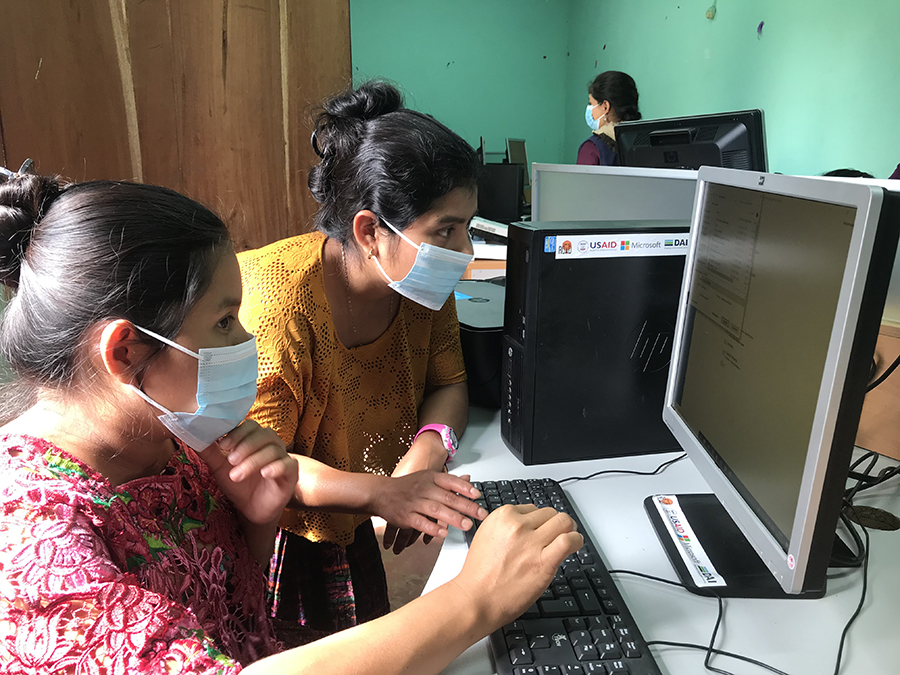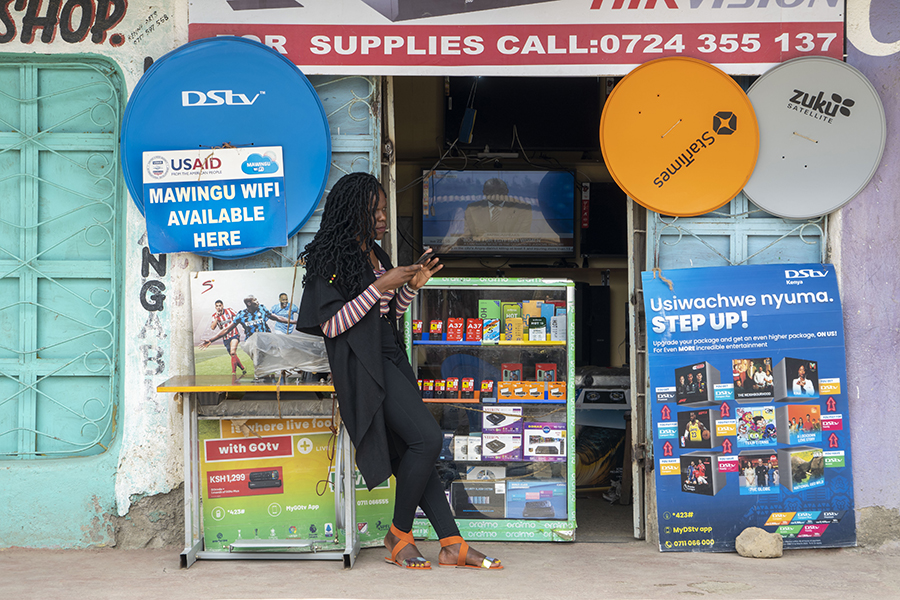Let us know what type of content you'd like to see more of. Fill out our three question survey.
Bridging the Gender Digital Divide: Four Approaches to Bringing Women Online From the USAID/Microsoft Airband Initiative
Jun 22, 2023
Globally, women are 18 percent less likely than men to own a smartphone. This statistic illustrates—particularly in low-income, rural households—the “gender digital divide,” where women are less likely to be connected to the internet and lack access to important tools that could improve their lives.
The gender digital divide limits women and girls’ opportunities on all fronts—from gaining an education to accessing their finances online to participating in politics and society.
Recognizing how digital inclusion empowers women and boosts the economies of rural communities, the USAID/Microsoft Airband Initiative has partnered with six private companies in five countries to provide women and girls with meaningful connectivity, internet access, and the skills necessary to navigate the digital world.

Photo: New Sun Road.
Here are four approaches that the USAID/Microsoft Airband Initiative is employing to bring women and girls in rural areas online:
1. Increasing Access: Connecting Women Through Digital Community Centers
Digital community centers are physical spaces that provide access to the internet, technology devices, and digital skills. Three of the initiative’s partners—Anditel, New Sun Road, and Bluetown—are operating community centers in remote areas that lack internet connectivity, involving women as both managers and customers. Altogether, these companies have established 26 digital community centers in the countries where they operate: Colombia, Guatemala, and Ghana.
To encourage more women to visit, both Anditel and New Sun Road hired women from the communities to manage the centers and lead various activities and training. These leaders have brought positive change to their communities by promoting the adoption of digital technologies and helping visitors see how technology can bring value to their lives. They also provided digital literacy training and access to digital resources and created safe spaces for women to learn and use technology. To date, 26 community centers have trained more than 6,650 women on topics like email basics, safe internet browsing, digital content creation, how to use Microsoft Office applications and tips on becoming an entrepreneur.
“[The digital community center] inspired me to continue learning and acquiring technological skills. The digital literacy course and the leadership committee training have been a great personal contribution. Now, I am very happy working for the Community Center, and I am convinced that the teamwork that we achieve will contribute to its sustainability,” said Delfina Chó, a 42-year-old entrepreneur from Chajché, Guatemala. “We can be a good business model—an example and also an inspiration for other women and communities.”
To ensure the centers’ sustainability, each partner has adopted different business models to generate revenue and continue operations. The New Sun Road centers are administered by women’s leadership committees and run as micro businesses. In addition to internet access, the centers offer services at a fee, including photocopying, printing, scanning, and phone and laptop charging, which fund the committees’ salaries and the centers’ operational costs. Similarly, Bluetown is considering turning the centers into internet cafés, where visitors pay a small fee to use its services. Anditel, on the other hand, is pursuing partnerships with local organizations so centers can continue their operations.
2. Driving Meaningful Connectivity: Building Digital Literacy Skills Through Tailored Training
Access to the internet is just the first step in connecting remote areas to the rest of the world. The meaningful adoption of technology for personal and economic advancement is just as important. The USAID/Microsoft Airband Initiative partnered with AirJaldi, which provides broadband to India’s most remote areas, to increase women’s digital literacy skills through training and guidance.
With a focus on accessibility and inclusivity, AirJaldi’s training is both virtual and face-to-face and tailored to meet the needs of all participants, regardless of their experience with technology. The modules provide women with the knowledge and skills to safely navigate the internet, access information and opportunities, and take advantage of the many benefits of technology. The modules are also regularly redesigned and updated based on participant feedback from surveys and focus groups. Tashi, a salon owner, has used her new online skills to surf the web and grow her business. “The training has taught me the benefits of the internet,” she said, “I can visit YouTube to check out hairstyles and products.” Tashi is also using digital financial tools to offer a convenient payment option for her customers. “Nowadays many people don’t use cash so online payment has made transactions much easier,” she said.
Other initiative partners have also tailored their training to help women effectively use the internet. Bluetown, for example, has established partnerships with different organizations to offer specific training at the center for its diverse visitors, with a focus on students, farmers, college graduates, and job seekers. In total, the initiative has taught digital literacy skills to more than 12,000 women.
3. Empowering Women: Sales Strategies for Inclusive Connectivity
Prioritizing women’s needs can create more inclusive markets and help companies like M-KOPA to bridge the gender digital divide. M-KOPA provides underbanked customers in Africa with smartphones, internet plans, and other essential services. Over time, M-KOPA realized that it sold significantly more products to men than to women. By adopting innovative sales strategies to address this gap, M-KOPA increased its reach and brought the benefits of Internet access to more women.
One of M-KOPA’s key strategies was to increase the number of female sales agents in its workforce and incentivize sales to women. With more women in sales positions, M-KOPA created a more approachable environment for its female customers, who felt more trusting and at ease when speaking with other women.
M-KOPA also provided its sales agents with access to M-KOPA Academy for training to better understand the specific needs, concerns, and preferences of female customers and how to effectively communicate with them. By training its sales agents, M-KOPA ensured they were well-equipped to engage with and provide more tailored service to female customers. Through the USAID/Microsoft Airband Initiative, M-KOPA reached more than 200,000 female customers and improved its overall sales outcomes—while ultimately helping bring more women online.
4. Engaging Local Partners and Creating Community Networks
Local partnerships and community engagement are instrumental in the USAID/Microsoft Airband Initiative. All six partners work with local organizations to respond to the needs and aspirations of women in rural areas, including inviting existing women’s associations and collectives to become involved in the centers and receive training on topics like digital agriculture for farmers, STEM for young girls, business management for entrepreneurs, and job-seeking skills for college graduates. Additionally, the partnerships have built networks where women find support, share knowledge, and connect with each other. This in turn promotes a sense of community and belonging.
For instance, Mawingu is another of the initiative’s partners, working in Kenya to expand the internet to rural and remote areas. In March 2022, Mawingu rolled out its Digital Biashara Networks, which are online-offline community forums for female entrepreneurs to connect and share experiences, challenges, and business advice, and provide mentorship to other women.
Rachel, a shop owner from Karagita, Kenya, was excited when she first heard about the program: “When Mawingu visited my shop and explained [the program], I immediately said ‘yes’ because I knew [what the] availability of internet means to me. When they introduced the training, I quickly jumped into it since I wanted to learn more tips on how I could grow my business. […] The network has also given me an opportunity to interact with other businesses so that we can learn from them.”

Photo: Mawingu.
Using these four approaches, the USAID/Microsoft Airband Initiative has brought together diverse expertise and resources to improve the lives of women through meaningful internet connectivity. The initiative has reached more remote communities, bringing opportunities for women to invest in their personal and professional development and for its partners to test the feasibility of incorporating gender-specific approaches into their core business models.
By developing interventions that respond to the specific needs of women and girls, the USAID/Microsoft Airband Initiative demonstrates the powerful potential of public-private partnerships in creating a more inclusive and equitable digital society.
The USAID/Microsoft Airband Initiative is implemented by DAI’s Digital Frontiers project, a buy-in mechanism that works closely with USAID Missions and Bureaus, the private sector, and international and local development organizations to identify successful and sustainable digital development approaches and scale their impact globally.
Lana Alnesany is a Senior Communications Specialist on DAI’s Digital Frontiers Project.